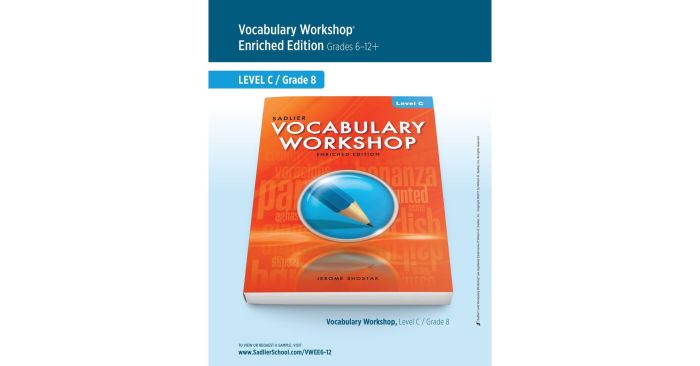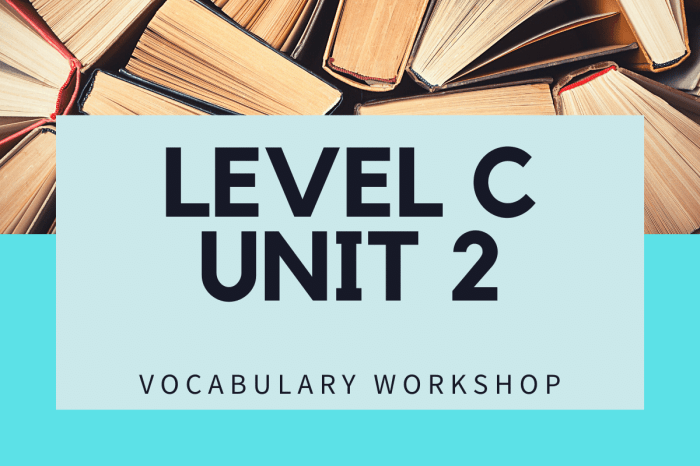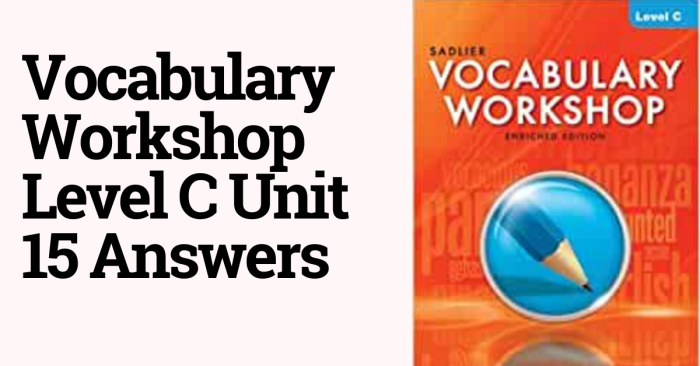Unit 10 vocabulary workshop level c – Unit 10 Vocabulary Workshop: Level C embarks on a comprehensive exploration of vocabulary acquisition techniques, contextual understanding, word relationships, and practical applications, culminating in an in-depth examination of vocabulary assessment and technology-driven vocabulary development.
This workshop is designed to empower learners with a diverse range of strategies for expanding their vocabulary, fostering a deep understanding of word usage and relationships, and equipping them with the tools to effectively incorporate new words into their daily communication.
Vocabulary Acquisition Techniques
Expanding vocabulary is essential for effective communication and cognitive development. Various techniques can enhance vocabulary acquisition, each offering unique benefits.
Benefits of Diverse Techniques:
- Addresses different learning styles and preferences.
- Reinforces learning through multiple exposures.
- Reduces boredom and promotes engagement.
Repetition and Spaced Retrieval
Repetition and spaced retrieval are crucial for effective vocabulary acquisition. Repetition strengthens memory traces, while spaced retrieval enhances long-term retention. By reviewing words at increasing intervals, learners can gradually move them from short-term to long-term memory.
Contextual Understanding

Contextual understanding is the ability to comprehend the meaning of words and phrases within the context of a text. It is a crucial aspect of vocabulary development, as it allows learners to acquire new words and expand their vocabulary.
To use context clues to infer the meaning of unfamiliar words, learners can look for clues within the surrounding text. These clues can include:
- Definition or explanation:The writer may provide a direct definition or explanation of the unfamiliar word.
- Synonym or antonym:The writer may use a synonym (a word with a similar meaning) or an antonym (a word with an opposite meaning) to clarify the unfamiliar word.
- Example:The writer may provide an example of how the unfamiliar word is used.
- Comparison or contrast:The writer may compare or contrast the unfamiliar word with a more familiar word.
Techniques for Improving Contextual Comprehension
There are several techniques that learners can use to improve their contextual comprehension, including:
- Read widely:The more learners read, the more context clues they will encounter. This will help them to develop a better understanding of how words are used in different contexts.
- Pay attention to context:When reading, learners should pay attention to the surrounding text. This will help them to identify context clues that can help them to understand unfamiliar words.
- Use a dictionary or thesaurus:If learners are unsure of the meaning of a word, they can use a dictionary or thesaurus to look it up. This can help them to confirm their understanding of the word.
- Discuss unfamiliar words with others:Talking about unfamiliar words with others can help learners to better understand their meaning. This is especially helpful for words that have multiple meanings.
Word Relationships

Word relationships play a crucial role in expanding vocabulary. Understanding the connections between words helps learners grasp their nuances and usage, leading to more precise and effective communication.
Synonyms
Synonyms are words that have the same or similar meanings. Identifying synonyms allows learners to expand their vocabulary and avoid repetition in writing and speaking. For instance, the words “happy,” “joyful,” and “elated” are synonyms that convey the same emotion.
- Example: List synonyms for the word “big”: large, enormous, colossal
Antonyms
Antonyms are words that have opposite meanings. Understanding antonyms helps learners distinguish between contrasting concepts and ideas. For instance, the words “hot” and “cold” are antonyms that represent opposite temperatures.
- Example: Find antonyms for the word “good”: bad, evil, wicked
Homophones, Unit 10 vocabulary workshop level c
Homophones are words that sound the same but have different meanings and spellings. Distinguishing between homophones is essential for accurate communication. For instance, the words “there,” “their,” and “they’re” are homophones that can be confusing.
- Example: Identify the homophone for the word “write”: right
Semantic Maps and Word Webs
Semantic maps and word webs are graphical representations that help learners visualize and explore word relationships. These tools allow learners to connect words with related meanings, identify synonyms and antonyms, and expand their vocabulary.
In a semantic map, words are placed in circles and connected with lines to show their relationships. For instance, a semantic map could connect the words “dog,” “animal,” “mammal,” and “pet.” In a word web, words are arranged in a branching structure, with related words connected by lines.
For instance, a word web could show the different meanings of the word “run.”
Vocabulary in Practice
Incorporating new vocabulary into daily communication is crucial for expanding language proficiency. Various techniques can be employed to effectively integrate new words into conversations and writing.
Using New Words in Context
Using new words in context is essential for comprehension and retention. When encountering an unfamiliar word, make an effort to understand its meaning from the surrounding text or conversation. This provides a practical understanding of how the word is used in different situations.
Expanding Vocabulary through Reading, Writing, and Conversation
Reading, writing, and conversation are powerful tools for expanding vocabulary. Reading exposes learners to a wide range of words and contexts, while writing helps solidify new words in memory. Conversation provides opportunities to actively use and practice new vocabulary in real-life situations.
| Technique | Description |
|---|---|
| Read extensively | Expose yourself to a variety of texts, including books, articles, and online content. |
| Use flashcards | Create flashcards with new words and their definitions, reviewing them regularly. |
| Keep a vocabulary journal | Write down new words, their meanings, and examples of their usage. |
| Use online resources | Utilize online dictionaries, thesauruses, and vocabulary builders to enhance your vocabulary. |
| Engage in conversation | Actively participate in conversations and discussions, making an effort to use new words appropriately. |
| Write regularly | Write short stories, essays, or journal entries, incorporating new vocabulary to enhance your writing skills. |
Vocabulary Assessment
Assessing vocabulary knowledge is crucial for educators and learners alike, as it provides valuable insights into an individual’s comprehension and usage of words. Various methods can be employed to evaluate vocabulary proficiency, each with its own advantages and limitations.
Methods of Vocabulary Assessment
Multiple methods are available for assessing vocabulary knowledge, including:
- Oral Assessment:Involves direct interaction between the assessor and the learner, allowing for immediate feedback and evaluation of pronunciation, fluency, and vocabulary usage.
- Written Assessment:Typically involves tasks such as multiple-choice questions, cloze tests, and sentence completion, providing a more standardized and quantifiable measure of vocabulary knowledge.
- Cloze Tests:Present learners with a text with missing words, requiring them to fill in the blanks with appropriate vocabulary. This method assesses both receptive and productive vocabulary skills.
- Picture-Based Assessment:Utilizes images or illustrations to test vocabulary comprehension and usage, particularly beneficial for younger learners or those with limited literacy skills.
li> Self-Assessment:Involves learners evaluating their own vocabulary knowledge through self-reflection and reporting, providing insights into their strengths and areas for improvement.
Technology for Vocabulary Development: Unit 10 Vocabulary Workshop Level C

Technology has revolutionized the way we acquire and develop vocabulary. Numerous tools and resources are available to support learners at various levels and cater to different learning styles.
These tools enhance learning and engagement by providing interactive and personalized experiences. They can:
- Provide instant access to definitions and pronunciations.
- Offer interactive games and exercises to reinforce learning.
- Create personalized learning paths based on individual needs.
- Connect learners with native speakers and experts.
Selecting Appropriate Tools
Selecting the appropriate technology tools for vocabulary development depends on several factors, including:
- Learning style:Some learners prefer visual aids, while others learn best through auditory or interactive experiences.
- Learning level:Beginners may benefit from basic tools with clear explanations, while advanced learners can explore more complex resources.
- Access to technology:Learners should have access to the necessary devices and internet connectivity.
Educators and learners should carefully consider these factors when choosing technology tools to maximize vocabulary acquisition.
FAQ Explained
What is the primary focus of Unit 10 Vocabulary Workshop: Level C?
Unit 10 Vocabulary Workshop: Level C focuses on providing learners with a comprehensive understanding of vocabulary acquisition techniques, contextual understanding, word relationships, and practical applications, with an emphasis on vocabulary assessment and technology-driven vocabulary development.
How does this workshop help learners expand their vocabulary?
This workshop provides learners with a diverse range of strategies for acquiring new vocabulary, fostering a deep understanding of word usage and relationships, and equipping them with the tools to effectively incorporate new words into their daily communication.
What is the significance of contextual understanding in vocabulary development?
Contextual understanding plays a crucial role in vocabulary development as it enables learners to infer the meaning of unfamiliar words by examining the surrounding context, enhancing their comprehension skills and overall vocabulary knowledge.